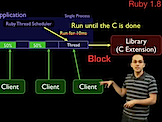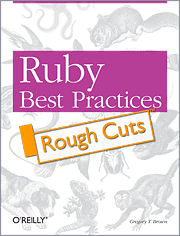 HappyMapper is John Nunemaker’s attempt at “making XML fun again” for Rubyists by providing an object to XML mapping library with a succinct syntax. Essentially, you can use HappyMapper to rapidly turn XML into Ruby objects – even nesting them inside and referring to each other. This is powerful stuff. To install, just gem install happymapper
HappyMapper is John Nunemaker’s attempt at “making XML fun again” for Rubyists by providing an object to XML mapping library with a succinct syntax. Essentially, you can use HappyMapper to rapidly turn XML into Ruby objects – even nesting them inside and referring to each other. This is powerful stuff. To install, just gem install happymapper
John’s own examples are powerful demonstrations of how it works, so check them out. The first is parsing the XML returned from Twitter. The statues and associated users in that XML can be processed (with the relationship maintained) with the following code:
class User
include HappyMapper
element :id, Integer
element :name, String
element :screen_name, String
element :location, String
element :description, String
element :profile_image_url, String
element :url, String
element :protected, Boolean
element :followers_count, Integer
end
class Status
include HappyMapper
element :id, Integer
element :text, String
element :created_at, Time
element :source, String
element :truncated, Boolean
element :in_reply_to_status_id, Integer
element :in_reply_to_user_id, Integer
element :favorited, Boolean
has_one :user, User
end
statuses = Status.parse(xml_string)
statuses.each do |status|
puts status.user.name, status.user.screen_name, status.text, status.source, ”
end
Added: Or.. Read More
 Everyone’s favorite Australian Ruby developer, Dr. Nic Williams, has put together a handy slide presentation called How to Package Your Ruby Code where he demonstrates how he packages his various bits of Ruby code using RubyGems. His process is backed by his own NewGem, a library that generates a framework for a new Ruby gem, and Hoe by Ryan Davis.
Everyone’s favorite Australian Ruby developer, Dr. Nic Williams, has put together a handy slide presentation called How to Package Your Ruby Code where he demonstrates how he packages his various bits of Ruby code using RubyGems. His process is backed by his own NewGem, a library that generates a framework for a new Ruby gem, and Hoe by Ryan Davis.
 If you read Ruby Inside in 2006, you might remember
If you read Ruby Inside in 2006, you might remember  At
At  If you’ve ever investigated how to build your own compiler, you might be familiar with
If you’ve ever investigated how to build your own compiler, you might be familiar with 

 Earlier this month,
Earlier this month, 
 When you want your objects to refer to / have associations with other objects, it can quickly become a complex procedure. Ryan Daigle to the rescue! Ryan has built
When you want your objects to refer to / have associations with other objects, it can quickly become a complex procedure. Ryan Daigle to the rescue! Ryan has built 


